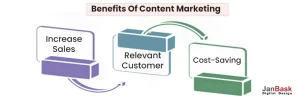
Gone are those days when traditional ads like TV ads, radio ads, print ads, etc. were the only popular marketing modes, they ruled the marketing industry and successfully helped businesses to establish and gain more leads. But all of these traditional advertisement modes were not always pocket-friendly for small-scale or average businesses and only big brands used to invest more in them.
So what about rest? Thanks, digitization has given us many revolutionary modes of advertisements that can be used by every scale of business. Though traditional advertising methods like radio spots and television ads have topped the marketing strategies for many decades—now marketing is moving in a digital direction.
For every business, it’s important to get your name and products in front of the right people. Content Marketing and Advertising are the two most important essentials to achieve that and for making every business successful. But marketers usually get confused about which one is best for business. So, this content marketing vs advertising blog will help you decide the same and therefore we will discuss the following points;
So let’s get started...
Looking for Content Marketing Services?

People often confuse the two as both Content Marketing vs Advertising are used to share a kind of the same purpose and get the message out about your business, your products or your service. However, the mediums are very different. But they have a fine line of difference with respect to goals and it is essential to understand this difference before experimenting with them.
Let’s take a look at advertising vs marketing to understand how content marketing differs from traditional advertising, and how content marketing works for businesses.

Advertising can be said as a special activity for producing necessary information for promoting commercial products or related services. Usually, advertisements follow a simple base and also work for an informational purpose or for awareness. Through advertisements, you can create and enhance brand awareness across various platforms and demographics. Effective advertising will make a positive impression about your product and the brand, change their general perception and drive them to generate sales.
When We talk about traditional advertising modes, we mean the following forms of advertisements;
But primarily, advertising is more about awareness. All the above modes of advertisements have been used by marketers of every business for years and they achieved a different levels of results depending upon efforts, investments, and other factors.
Digital ads can be of different forms as listed below.
Display ads are image, text, and video ads shown to people as they browse websites, apps, and social media, with an intent to explore or purchase any product or service. Display ads allow for catchy messaging and help create initial interest and boost branding to stand out and attract attention. Different types of display ads are Text ads, Gmail ads, App ads, and App ads.
Video advertising is promotional content that plays before, during, or after streaming video content. Digital video ads allow advertisers to connect with audiences in a format they prefer and give advertisers unique opportunities to engage and convert prospects better than other ad formats. Different types of video ads are Outstream ads, Bumper ads, Skippable in-stream ads, Non-skippable in-stream ads, and Discovery ads.
Social media ads are served to users on social media platforms, allowing you to reach a wider audience and increase your brand awareness and engagement on the respective social media platforms. Social networks utilize user information to serve highly relevant ads based on interactions within a specific social media platform.
Pay-per-click (PPC) is an online advertising strategy in which you only pay when people click on your ad and you're paying for visitors to come to your site via ads on SERPs. Google Ads is the best example of PPC ads.
Retargeting ads allow your business to show targeted ads to the users who have visited your website earlier but didn't complete a conversion. With retargeting ads, your brand and products stay at the forefront of past visitors who earlier showed interest in your product or services.
Content marketing shares a similar goal as that of traditional marketing but holds a different weight for which it is preferred.
Explore how to grow your business with Google ads and explore Google ads cost.
Over the last decade, a huge ratio of marketers has been trying different forms of marketing and advertising. With the great shift to digital media, companies nowadays are focusing more on digital advertising. Many of them have succeeded to a great extent in attracting relevant customers and turning them into potential leads and ultimately increasing sales. In this content marketing vs advertising guide, next, we are going to discuss the types of digital ads.

Content marketing is considered a great way to boost your bottom line and even boost the number of loyal customers. It is a specific type of marketing that includes content creation about your product/ services and then shares it in different forms like blogs, articles, videos, etc. The content across different social media channels not only promotes the brand but also attracts the interest of potential customers of the brand.
There are many types of content marketing that can help businesses grow in the long run. Although they are all valuable and effective, it's better to not stick with anyone. You can leverage different content marketing formats and repurpose the same content for reaching a huge audience.
Blogs are a great source of in-depth information, effective blogging is an essential part of an overall digital marketing strategy. It drives traffic to your website, generates new leads for your company, helps you nurture those leads, helps businesses establish authority, and gives you increased insight into your customer base.
Video content can spread brand awareness and provides a convenient way for prospects to become informed about your offering. In addition, if you publish regularly enough, people start getting familiarized with your brand, and nature of services and establish connections between your company and its audience.
The webinar helps businesses bring together a wide and varied group of people, make it easy to position your products or services in the minds of customers, and drive potential leads into your sales pipeline. Webinars are the leading content marketing practices for building trust and partnerships between your existing or prospective customer base and your SMEs.
E-books give businesses an opportunity to demonstrate their brand's capabilities and improve their customer relationships. E-books are an excellent way to demonstrate how your company overcomes industry challenges by weaving in your own case studies to improve lead generation and boost brand credibility and loyalty.
Customers want a company that excels in the industry, so the podcasts help build up that trust and allow you to communicate your knowledge and expertise, hence building your credibility. Regular podcasts with accurate information or ideas help establish your brand as an authority in the business. Using podcasts, you can share advice, industry insights, product review, tips, and specific event experiences – all of which showcase your knowledge.
Businesses use infographics in both digital and print media and are a very effective way of showing important statistics and information. An infographic can represent any data in a way that helps your audience understand the information easily. Infographics make it possible to grab audience attention fast, share information effectively and build brand awareness quickly and easily.
A whitepaper is an informational document usually issued by a company or not-for-profit organization to promote that a certain solution is best for a particular problem. When it is used for commercial purposes, it could influence the decision-making processes of current and prospective customers to build authority and boost sales in an organization.

It can be definitely considered the best option for your bottom line.

Businesses and consumers both tend to find new effective ways to grow more and for this, they always try new technologies and other modes. Despite the popularity of all the traditional advertising modes, marketing experts have a strong belief that content marketing has better return possibilities for every investment and that is why content marketing is considered the King.
How Content Marketing Is Different And A Good Choice?
No doubt that content marketing is one of the most widely used modes of marketing. It is very practical and lets people relate to the product or service in a better way. It is a powerful inbound marketing strategy that can help transform the way your organization reaches and engages your target audience.
What Do We Do In Content Marketing
We create effective blogs, articles, social media posts, web pages, white papers, etc., and post them on different social media channels to reach the relevant audience. So, whenever people search about any product or service in a search engine like Google, this content flashes in front of them through the SERP, where they can read our blogs or other content. It actually becomes visible to every person who is looking for related products or services. Therefore, content marketing attracts more potential customers.
Let’s Take A Glance At Some Advantages Of Content Marketing That Makes It Better Than Advertising
It has become next to impossible to achieve desired business goals through traditional advertising modes only. You must think out of the box and utilize content marketing in an effective way to see a revolutionary increase in the growth rate.
In this advertising vs marketing post, next, we are going to discuss the major differences between the two.
Traditional marketing pitches the consumers all about a business, a product, or service directly for sale. They show off images and direct information about whatever they want to sell.
Content marketing isn’t as direct as advertising, instead of showcasing and pitching things to sell, content marketing puts out informative & quality content that the target consumer finds interesting, useful, or valuable. Content marketing raises the audience's interest in particular products or services and then redirects them to the sales funnel.
Advertising banks on the fact that customers see your products/services and buy them instantly. Advertising is more focused on generating instant leads and conversions, but this rarely works.
Whereas in content marketing, you’re not directly pushing a product to sell, but you are consistently getting in front of your target customer with your captivating content relevant to your products or services. With content marketing, you are intended to make your customer feel that your product is better than other available options and how it adds value to their life.
Advertising is a marketing communication that employs openly sponsored, non-personal communication to promote or sell a product, or service. In advertising, you’re simply showing consumers what you’re selling and praising the benefits of that product or service to sell it.
Availing content marketing services, there is much more opportunity to build connections with consumers. You can ask them to leave comments or suggestions about your blog. Similarly, it allows you to respond back; letting you really get to know your potential customers and allowing them to really trust you. Using indirect pitch, make them feel how the particular product or service is helpful for them.
Advertising is about getting your message in front of as many people as possible whereas content marketing is about getting it in front of the right people only.
Content marketers spend time researching what information their audience is searching for and curate the content accordingly. Though content marketing pitches indirectly but it is more targeted than advertising.
Best Content Marketing Platforms:
Best Advertising Platforms:
Hope this content marketing vs advertising guide helps you understand the difference between content marketing and advertising.
Advertising helps drive qualified visitors whereas Content marketing helps you build brand authority and stand out from competitors in organic channels. Both content marketing and advertising are effective at their places, advertising merely promotes a product directly whereas content marketing develops relationships.
Keep in mind that content marketing does tend to be a bit slower to generate results than advertising practices. It takes time but, over time, you can produce consistent and valuable results. For instant results advertising is better to go with and for long-run business benefits, content marketing is better to choose.
Would you like to learn more about what content marketing and advertising can do for your business? JanBask is a leading industry expert for digital marketing services including both content marketing and advertising. Feel free to reach us.
Found this post helpful or want to explore more about content marketing vs advertising? Feel free to comment below, we’d love to answer.
Interested in our Digital Marketing Services?

Leave a Reply